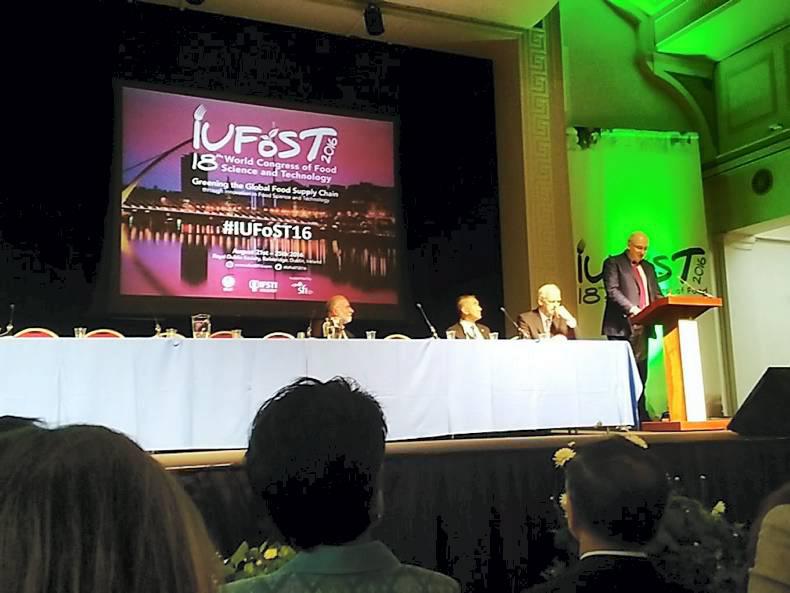Giving his keynote address at the conference, EU Commissioner for Agriculture Phil Hogan said farmers “must be empowered to embrace research and innovation, working in collaboration with scientists and investors to generate knowledge at an early stage.
“It is not good enough to have science and innovation and it all housed in our institutes and universities,” Hogan added. “It must be adaptable to the farm.”
The Commissioner was the keynote speaker at the opening session of the 18th World Congress of Food Science and Technology, which is taking place in the RDS in Dublin between 21 and 25 August.
The conference brings together representatives from over 500 different organisations and 65 countries, resulting in a global collaboration of leaders in food science, research and innovation.
Hogan continued to say that the challenge for scientists and researchers is how all the innovation and the funding provided at EU level can be adapted at an early stage to make it relevant to the farm.
He added that we need a “joint approach to feeding the growing population of the world”.
Challenge and supports
The Commissioner outlined the challenges currently faced by the global agri-food industry, including population growth, a growing middle class, the need for improved traceability in the food chain, climate change and an ageing demographic of farmers in the western world.
Let us look at the good as well as the challenges
But he added that these are accompanied by some positives, including the agreements on climate targets reached by the Paris Agreement last December and the World Trade Organisation (WTO) conference in Nairobi which saw a commitment to abolish export subsidies for agriculture exports for WTO countries.
“Let us look at the good as well as the challenges,” Hogan said.
Funding
Finally, the Commissioner outlined that there will be €3.6bn in European funding between now and 2020 under Horizon 2020 to fund synergy between agriculture and research. Horizon 2020 is the EU's research and innovation funding scheme.
He added that some €64m will be dedicated to precision farming and digital technologies under the Horizon work programme between 2016 and 2017.
Meanwhile, €30m will be devoted to the “internet of things”, a proposed development of the internet in which everyday objects have network connectivity, allowing them to send and receive data. The Commissioner said this is an “important instrument that will foster experimentation”.
Hogan did not discuss the implementation of the new €500m aid package announced at the Council of European agriculture ministers in July. The European Commission is expected to present details of the plan by the end of this month.
Teagasc, Kerry Group and Science Foundation Ireland are among the sponsors of the the IUFoST conference, which continues in the RDS until Thursday 25 August.
Read more
Agricultural research awarded €4m in funding
Here are the five technologies that will rock Irish agriculture
Agriculture must battle to attract best talent
Giving his keynote address at the conference, EU Commissioner for Agriculture Phil Hogan said farmers “must be empowered to embrace research and innovation, working in collaboration with scientists and investors to generate knowledge at an early stage.
“It is not good enough to have science and innovation and it all housed in our institutes and universities,” Hogan added. “It must be adaptable to the farm.”
The Commissioner was the keynote speaker at the opening session of the 18th World Congress of Food Science and Technology, which is taking place in the RDS in Dublin between 21 and 25 August.
The conference brings together representatives from over 500 different organisations and 65 countries, resulting in a global collaboration of leaders in food science, research and innovation.
Hogan continued to say that the challenge for scientists and researchers is how all the innovation and the funding provided at EU level can be adapted at an early stage to make it relevant to the farm.
He added that we need a “joint approach to feeding the growing population of the world”.
Challenge and supports
The Commissioner outlined the challenges currently faced by the global agri-food industry, including population growth, a growing middle class, the need for improved traceability in the food chain, climate change and an ageing demographic of farmers in the western world.
Let us look at the good as well as the challenges
But he added that these are accompanied by some positives, including the agreements on climate targets reached by the Paris Agreement last December and the World Trade Organisation (WTO) conference in Nairobi which saw a commitment to abolish export subsidies for agriculture exports for WTO countries.
“Let us look at the good as well as the challenges,” Hogan said.
Funding
Finally, the Commissioner outlined that there will be €3.6bn in European funding between now and 2020 under Horizon 2020 to fund synergy between agriculture and research. Horizon 2020 is the EU's research and innovation funding scheme.
He added that some €64m will be dedicated to precision farming and digital technologies under the Horizon work programme between 2016 and 2017.
Meanwhile, €30m will be devoted to the “internet of things”, a proposed development of the internet in which everyday objects have network connectivity, allowing them to send and receive data. The Commissioner said this is an “important instrument that will foster experimentation”.
Hogan did not discuss the implementation of the new €500m aid package announced at the Council of European agriculture ministers in July. The European Commission is expected to present details of the plan by the end of this month.
Teagasc, Kerry Group and Science Foundation Ireland are among the sponsors of the the IUFoST conference, which continues in the RDS until Thursday 25 August.
Read more
Agricultural research awarded €4m in funding
Here are the five technologies that will rock Irish agriculture
Agriculture must battle to attract best talent







 This is a subscriber-only article
This is a subscriber-only article










SHARING OPTIONS: